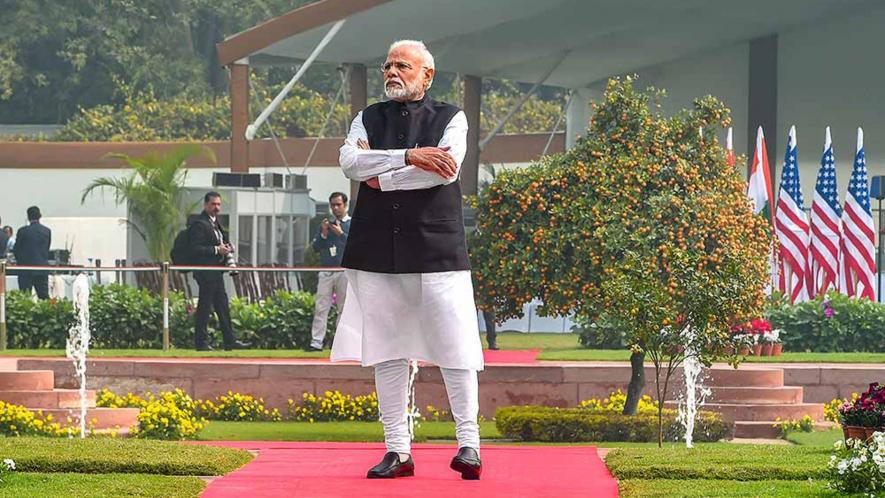Modi Govt’s 4+ Years: Promises Vs Grim Reality in ‘Amrit Kaal’

Image Courtesy: PTI
New Delhi: As the 2024 general elections inch closer and the public relations machinery of the Bharatiya Janata Party-led Narendra Modi government gets rolling, a citizens’ group has brought out a report, assessing its governance record and flagging serious issues that concern democracy and its future.
The report, Promises and Reality 2019-2023: Citizen Review of 4+ years of NDA II Government, by Wada Na Todo Abhiyan, an umbrella of 3,000 civil society groups and individuals, has flagged serious gaps and holes in the Modi government’s governance – be it parliamentary functioning, development, media handling and the condition of marginalised communities, such as dalits, adivasis and minorities.
Parliament: Hurried Bills, Lack of Debates
Take, for instance, the functioning of Parliament, where debates and discussions are considered key to upholding democratic in the best interests of the people. However, what has been witnessed is hasty rushing of crucial Bills, token debates and discussions and a marked drop in Bills being referred to the standing committees.
“…during the Monsoon Session of the Indian Parliament in 2021, a staggering 18 Bills were passed, with a mere 34 minutes of discussion allotted for each. During the Monsoon Session of 2023 (held from July 20 to August 11), Lok Sabha passed 22 Bills. 20 of these Bills were discussed for less than an hour before passing. Nine Bills, including the IIM (Amendment) Bill, 2023 and Inter-Services Organisation Bill 2023, were passed within 20 minutes in Lok Sabha. The Bills to create the National Nursing and Midwifery Commission and the National Dental Commission were discussed and passed together in Lok Sabha within three minutes,” notes the report.
The report also expresses serious concern over the declining number of Bills being referred to standing committees.
“The establishment of Parliamentary Standing Committees in 1993 was to bolster Parliament’s effectiveness in legislative and financial matters”, it says, adding that since 2004 (when the BJP-led National Democratic Alliance government cam to power) only 45% of introduced Bills were subjected to committee review.
“This trend has become more pronounced in recent years, notably in the 16th and current 17th Lok Sabha sessions. In the 2023 Monsoon session, out of 25 Bills introduced, only three were referred to committees. In this Lok Sabha, only 17 per cent of Bills have been directed to Committees, a lower figure compared to the previous three Lok Sabhas. This contrasts with practices in countries like the United Kingdom, where all Bills (excluding Money Bills) undergo a thorough examination by Committees,” said the report.
Also, as Prime Minister spares no opportunity to attack Opposition parties for alleged “corruption’ and has unleashed central agencies on BJP’s rival parties, the government’s own record on corruption flagged by none other than the government auditor raises several questions about the present dispensation's “consistent undermining of legislations and institutions of transparency and accountability (Bhrashtachar mukt Bharat – Promise versus Reality).”
“At least 12 CAG (Comptroller and Auditor General) reports tabled in the Parliament in August 2023 revealed corruption and irregularities in the functioning of several Union government ministries and departments. The only effective way to X Annual Governance Review report 2023 fight corruption in a democracy as vast as India is to empower citizens with appropriate tools and institutions to hold the government and its functionaries accountable.”
On the lack of debates and discussions in Parliament, the heart and soul of the democratic process, have been largely given a go-by, even when it comes to seeking parliamentary nod for spending crores of taxpayer money.
The report cites the instance of five Ministries’ expenditures totalling Rs.11 lakh crore being listed for discussion in Lok Sabha, but none were actually deliberated upon.
“Surprisingly, the proposed expenses of all Ministries, amounting to Rs 42 lakh crore, were passed without any discussion.’ It said, adding that “over the past seven years, an average of 79% of the budget has been approved without examination or debate. This limited discussion over the budget, too, calls for immediate rectification (PRS Legislative Research, 2023).”
Marginalised Communities: Where are They?
The report finds social exclusion of marginalised communities from education, healthcare as well as in ensuring their constitutional rights by the implementing authorities, despite a plethora of “verbal commitments” made by the Modi-led government.
It notes how school enrolment of marginalised children, which dropped during the pandemic, continues to decline due to growing economic distress, loss of livelihoods etc.
The report also notes “how despite recurring mentions from the government on the safety, protection, resilience and entitlements of Dalits and Tribals, the status of empowerment and systems of neglect have remained largely unchanged over the past four years. “
A combined effect of historical inequities and limited fiscal support has resulted in not only limiting the development of these constitutionally protected communities, but also putting them at a looming risk of climate change inequities with 31% of Scheduled Castes and 45% of Scheduled Tribes being at particular risk of climate change (Tribal and Dalit People Live Through a Climate of Atrocities),” it said.
On women, while government advertisements wax eloquent about schemes for women and focus on “women’s empowerment”, “there is an imminent need to define this empowerment in terms of wage parity, autonomy in decision-making, and addressing structural barriers for women across identities. That is the only way to move towards combating challenges such as the steady incline in crimes against women in the past 4 years, with over 30,000 complaints made in just the last year (Need to increase financial allocations for women).”
On religious minorities, especially Muslims, the report has devoted a chapter that discusses studies concluding that consistent social exclusion of Indian Muslims causes constant economic backwardness - with 31% below the poverty line.
“Compounding this impact, is the diminished sense of safety and security in the community, as evidenced by 204 incidents of cow vigilantism since 2014 and 539 incidents of violence against Christians in just nine months of 2023 (Imaging the apprehensions of Christians in Ten Years of Achhe Din).”
Get the latest reports & analysis with people's perspective on Protests, movements & deep analytical videos, discussions of the current affairs in your Telegram app. Subscribe to NewsClick's Telegram channel & get Real-Time updates on stories, as they get published on our website.
























